Warning: If you suffer from eating disorders or OCD please consider not reading this article.
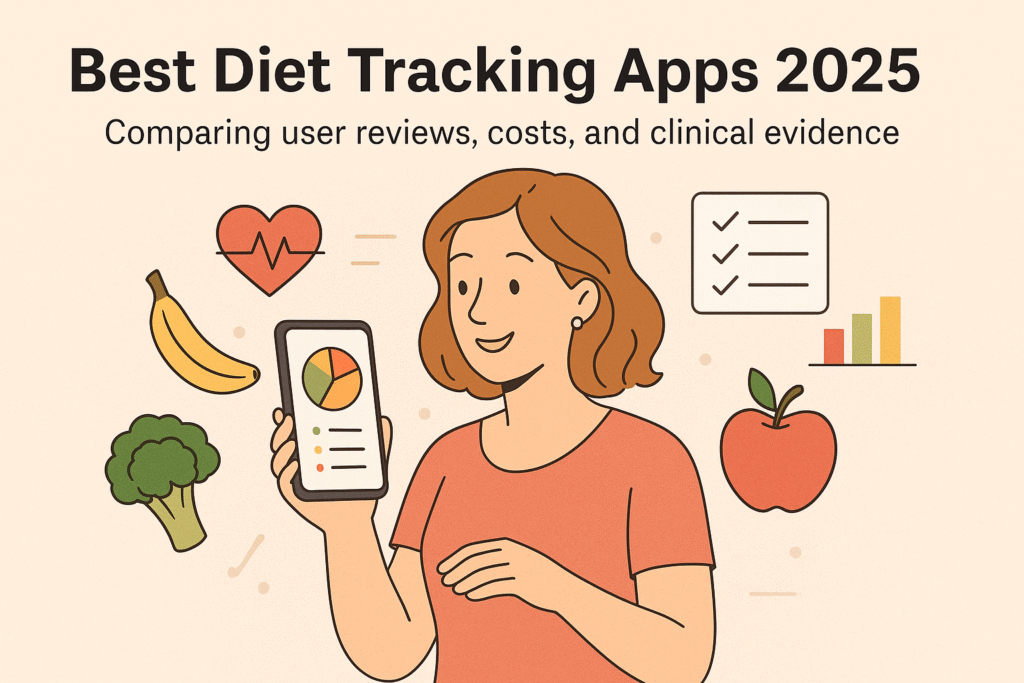
Looking for the best diet tracking app for 2025?
We compared popular nutrition and calorie-tracking tools like Cronometer, MacroFactor, Lose It!, YAZIO, Eated, and Hava using Reddit reviews, pricing data, and published clinical evidence — so you can see what actually works, not just what’s trending.
If you’ve ever downloaded a diet app with great intentions — then stopped logging by week three — you’re not alone.
For most of us, it’s not about “more willpower.” It’s about finding a tool that feels supportive, simple, and actually fits your life.
This year, I looked at what people are really saying on Reddit, what the science tells us, and what new tools like Hava are doing with the satiety-per-calorie idea — helping you eat in a way that keeps you full, not frustrated.
What We Compared
We reviewed eight popular diet apps based on:
- Real Reddit feedback (what users love and hate)
- Current UK pricing (2025)
- Clinical evidence from recent studies
- Ease of use and long-term sustainability
The Top Diet Tracking Apps for 2025
This comparison table summarises the most popular diet and nutrition tracking apps in 2025, bringing together real user experiences, current UK pricing, and clinical relevance.
It’s designed to help you find an app that suits your goals, whether you want detailed nutrient tracking, adaptive coaching, or a simpler, more mindful approach to eating.
Each app is rated on ease of use, feedback style, affordability, and how well it aligns with evidence-based behaviour-change principles — such as self-monitoring, feedback, satiety, and long-term habit formation.
Use this table to:
- Quickly compare features and costs across leading apps.
- Identify which tools best fit your motivation style — data-driven, supportive, or balanced.
- Spot emerging innovations like satiety-per-calorie scoring, which focus on how full you feel per calorie, not just counting numbers.
| App | Best For | Key Strengths | Common Complaints | Annual Cost (UK) | Website |
|---|---|---|---|---|---|
| Cronometer | Nutrition nerds | Accurate food data, detailed nutrients | Learning curve; limited free features | £70–£84 | https://cronometer.com/ |
| MacroFactor | Adaptive coaching | Smart calorie algorithm; forgiving tone | Subscription only | £132 | https://www.macrofactorapp.com/ |
| MyNetDiary | Everyday logging | Simple, reliable, workout integration | Premium needed for insights | £96 | https://www.mynetdiary.com/ |
| Lose It! | Easy calorie tracking | Big food database; clean design | Some inaccuracy in entries | £35 (or lifetime deal) | https://www.loseit.com/ |
| CalorieDaddy | Motivation & humour | “Roasts” your diet daily; fun tone | Not for sensitive users; new app | Free + upgrade | https://apps.apple.com/us/app/caloriedaddy/id6748579611 |
| Eated | Mindful eating | Focus on balance not restriction | Fewer analytics | £108 | https://www.eated.app/ |
| YAZIO | Visual learners | Barcode scanner; colourful visuals | Ads in free version | £25 | https://www.yazio.com/en |
| Hava (Satiety per Calorie) | Fullness & appetite control | Rates foods by satiety (protein %, fibre, energy density) | Still new; not fully validated | Free / premium TBA | https://www.hava.co/ |
What Real Users Say
Reddit discussions reveal clear patterns:
- Cronometer wins for data accuracy and micronutrient detail.
- MacroFactor stands out for its coaching algorithm that adjusts calories automatically when progress changes.
- Lose It! remains a favourite for simplicity and affordability.
- Eated appeals to users wanting a gentler, more habit-based approach.
- Hava, a newer entry, introduces a science-backed Satiety per Calorie model that may redefine how we think about fullness.
What the Evidence Says
| Research Finding | Summary | Reference |
|---|---|---|
| Apps help, modestly | Average weight loss 1–2.5 kg over 3–6 months with consistent use. | https://pubmed.ncbi.nlm.nih.gov/39757698/ |
| App alone ≠ success | MyFitnessPal RCT showed no added weight loss over usual care. | https://pmc.ncbi.nlm.nih.gov/articles/PMC4422872/ |
| Daily logging works | Frequency of self‑monitoring is the strongest predictor of results. | https://mhealth.jmir.org/2019/2/e12209/ |
| Adaptive feedback helps | Apps that adjust goals or provide coaching achieve better adherence. | https://www.jmir.org/2023/1/e42432/ |
| Gamification supports engagement | Challenges and rewards maintain consistency. | https://www.jmir.org/2022/9/e40141/ |
| Satiety‑per‑Calorie concept | High‑protein, high‑fibre foods improve fullness per calorie. | https://www.hava.co/science |
How Each App Aligns with the Science
This comparison table summarises the most popular diet and nutrition tracking apps in 2025, bringing together real user experiences, current UK pricing, and clinical relevance.
It’s designed to help you find an app that suits your goals, whether you want detailed nutrient tracking, adaptive coaching, or a simpler, more mindful approach to eating.
Each app is rated on ease of use, feedback style, affordability, and how well it aligns with evidence-based behaviour-change principles — such as self-monitoring, feedback, satiety, and long-term habit formation.
Use this table to:
- Quickly compare features and costs across leading apps.
- Identify which tools best fit your motivation style — data-driven, supportive, or balanced.
- Spot emerging innovations like satiety-per-calorie scoring, which focus on how full you feel per calorie, not just counting numbers.
| App | Logging Ease | Feedback / Coaching | Behaviour Support | Gamification | Satiety Awareness | Overall Evidence Alignment |
|---|---|---|---|---|---|---|
| Cronometer | ✅ Excellent | ⚠️ Manual | ⚠️ Data‑driven | ⚠️ Minimal | ⚠️ Implicit | High for accuracy, low for engagement |
| MacroFactor | ✅ Smooth | ✅ Adaptive | ✅ Coaching logic | ⚠️ Light | ⚠️ None | Very High — strong evidence fit |
| MyNetDiary | ✅ Easy | ⚠️ Static | ⚠️ Basic goals | ⚠️ Some visuals | ⚠️ None | Medium–High |
| Lose It! | ✅ Fast | ⚠️ Static | ⚠️ Habit forming | ✅ Gamified | ⚠️ None | Medium |
| CalorieDaddy | ✅ Simple | ⚠️ Humour only | ⚠️ Fun, not structured | ✅ Strong motivation | ⚠️ None | Low–Medium |
| Eated | ⚠️ Manual | ⚠️ Habit reminders | ✅ Mindful tone | ⚠️ None | ⚠️ None | Medium–High |
| YAZIO | ✅ Easy | ⚠️ Static | ⚠️ Moderate | ✅ Fun visuals | ⚠️ None | Medium |
| Hava | ✅ Simple | ✅ SPC‑based | ✅ Satiety education | ⚠️ None | ✅ Core feature | Promising / emerging evidence |
🌱 The Ideal App — and Who It’s For
If you’ve ever felt that calorie counting helps but doesn’t quite get you there, the research agrees.
The ideal approach combines:
- Fast, low-friction logging
- Adaptive feedback
- Balanced mindset
- Satiating foods
- Affordable access
In reality:
- MacroFactor is closest to the evidence-based “smart coach.”
- Hava is innovating with fullness per calorie science.
- Eated excels for those wanting sustainable, guilt-free balance.
The Takeaway
The best diet app isn’t the one with the most graphs — it’s the one that helps you stay curious, consistent, and kind to yourself.
Data helps, but how you interact with it matters more.
Whether you want structured coaching, a quick calorie log, or a way to understand fullness better, there’s now an app that fits your life stage — and your sanity.
Final Thoughts
Key takeaway:
Apps do help—but only if you use them consistently and pair tracking with feedback or coaching.
The most effective tools combine science-based design, ease of use, and psychological support.
- For data precision → Cronometer or MacroFactor
- For simplicity → Lose It! or MyNetDiary
- For habit building → Eated or YAZIO
- For motivation with humour → CalorieDaddy
- For satiety science fans → Hava
Choose the one that makes tracking feel easy—and you’ll already be ahead.
Do diet-tracking apps really work?
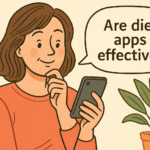
Yes — but results are usually modest. Clinical studies show most users lose about 1 – 2.5 kg in the first three to six months if they track consistently.
Apps work best when combined with personalised feedback, coaching, or social support rather than used alone.
📖 Evidence: https://pubmed.ncbi.nlm.nih.gov/39757698/ and https://pmc.ncbi.nlm.nih.gov/articles/PMC4422872/
Which diet-tracking app is best for weight loss?
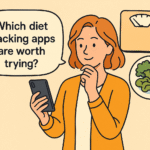
It depends on your style:
Cronometer / MacroFactor – for accuracy and adaptive feedback
Lose It! / MyNetDiary – for quick, everyday logging
Eated / YAZIO – for gentle habit building
Hava – for a satiety-per-calorie approach that focuses on fullness instead of calorie counting.
What is “Satiety per Calorie”?
“Satiety per Calorie” (SPC) measures how filling a food is for its calorie cost.
Foods higher in protein, fibre, and water—and lower in energy density—score higher on satiety.
Apps like Hava use this science to help you pick foods that keep you full on fewer calories.
📖 More info: https://www.hava.co/science
Are calorie-tracking apps safe for mental health?
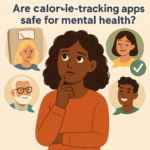
Most users find them motivating, but anyone with a history of eating disorders or obsessive behaviours should use them cautiously.
Look for apps that encourage balanced meals, rest days, and self-compassion (like Eated or MacroFactor).
If tracking becomes stressful, it’s better to step back or seek professional guidance.
📖 Guidance: https://pmc.ncbi.nlm.nih.gov/articles/PMC8485346/
How can I get the most out of a diet app?
Log daily, even imperfectly.
Weigh or scan food for accuracy.
Reflect weekly—not obsessively.
Use reminders or streaks to stay consistent.
Focus on progress, not perfection.
Are free diet apps good enough?
Yes — for many people the free versions of Lose It!, MyNetDiary, or Cronometer provide everything needed to start.
Premium upgrades add analytics or coaching, but consistency matters far more than paid features.
What makes this guide different?
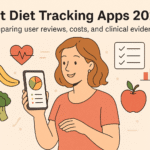
Most “best app” lists are affiliate round-ups.
This article combines Reddit user feedback with peer-reviewed clinical research and includes full source links, so readers can check the evidence themselves.
Did you mean… (tap to expand/collapse)
| Intended term | Common misspellings / variants | Why it happens | Redirect to |
|---|---|---|---|
| Couch-to-5K (C25K) | couch to 5k, couch 2 5k, couch-2-5k, c25 k, c2 5k, couch to five k, couch25k, coach to 5k | Hyphen/number spacing; “2” for “to”; autocorrect to “coach” | /c25k-apps |
| C25K week 3 | c25k wk3, week3 c25k, c25k w3, week 3 couch to 5k | Abbreviation + spacing | /c25k-apps#week-3-tips |
| Just Run (app) | justrun, just run 5k, just run zero to 5k, zero to five k | Name variants; number words | /c25k-apps#just-run |
| Nike Run Club (NRC) | nike running app, nrc app, nike club run, nike runclub | Brand + product merged/swapped | /c25k-apps#nike-run-club |
| Zombies, Run! (ZRX) | zombies run, zombie run, zrx app, marvel move zombies | Punctuation dropped; sub-brand confusion | /c25k-apps#zombies-run |
| Zombies, Run! 5K Training | zombies run 5k, zombie 5k training, 5k zombies app | Series vs spin-off mixing | /c25k-apps#zombies-run |
| None to Run | none2run, non to run, none-to-run, ntr app | “to/2” swap; hyphenation variants | /c25k-apps#none-to-run |
| Seconds (interval timer) | seconds timer, seconds pro, second timer, interval seconds | Product line/word-order variants | /c25k-apps#seconds-interval-timer |
| C25K by Zen Labs | c25k zen, zenlabs c25k, couch to 5k zen, zen labs | Brand order + spacing | /c25k-apps#c25k-zen-labs |
| MapMyRun | map my run, mapmy run, map myrun, mapmyrun app | Spacing variants | /c25k-apps#mapmyrun |
| Boogie Shoes (podcast) | boogieshoes, boogie shoes c25k, boogie runs | Title punctuation/spacing | /c25k-apps#boogie-shoes |
| Runna | runna app, runner app, runa | Double-“n” missed; sound-alike | /c25k-apps#runna |
| GPS tracking | gps tracking, g p s, route map, run map | Synonyms/spacing | /c25k-apps#gps-tracking |
| Apple Watch support | applewatch, iwatch, watch os, apple watch app | Legacy name; platform term | /c25k-apps#apple-watch |
| Wear OS / Android watch | wearos, wear os, android wear, wear OS | Platform rename confusion | /c25k-apps#wear-os |
| Strava sync | stava, stravia, strva, connect to strava | Brand typos | /c25k-apps#strava |
| Guided runs | guided run, audio coach, coaching audio, coach runs | Synonyms | /c25k-apps#guided-runs |
| Interval timer | intervaltimer, intervals timer, run walk timer, run/walk timer | Compound word variants | /c25k-apps#interval-timer |
| Strength & mobility | strength and mobility, S&C, mobility drills, prehab | Jargon vs plain language | /c25k-apps#strength-mobility |
| Share with friends / challenges | friend share, run sharing, teams, team challenges, leaderboards | Different social wording | /c25k-apps#social-sharing |
